Celtic Cross Spread
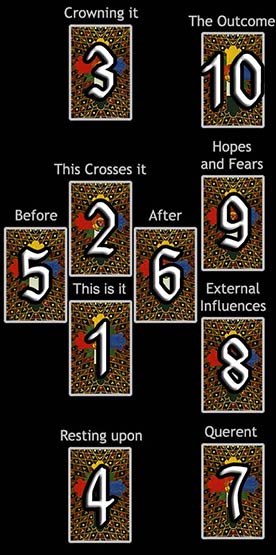
Difficulty: Average
This is probably the most well-known tarot spread. A good, basic spread for beginners to practise with, the Celtic Cross is useful for questions of all types. In this spread, it can be helpful to notice the relationships between the pairings of cards #5 & #9, #1 & #2, #3 & #4, and #6 & #10.
- The significator epitomizes what the reading deals with, the initial situation.
- An added impulse that compounds the significator, which may be either complimentary or contradictory.
- This is what is consciously known (thoughts).
- Unconscious driving forces that may not be known fully (emotions).
- The immediate past regarding the current situation.
- The first future card indicates the immediate future.
- This card represents the reader and their attitude towards cards #1 and #2.
- The external influences, the places and people which influence the topic.
- This tarot card suggests expectations; what is secretly hoped for or feared.
- The second future card reveals the long-term outcome.
Your Celtic Cross Reading
The Crown |
The Outcome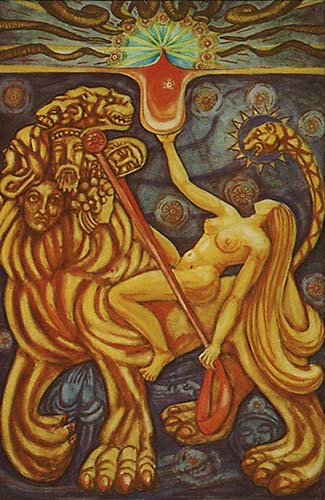 XI – Lust
External Forces 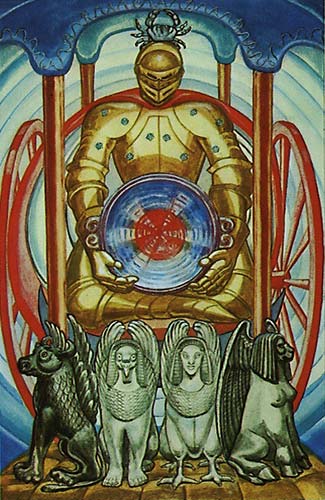 VII – The Chariot
|
||
The Recent Past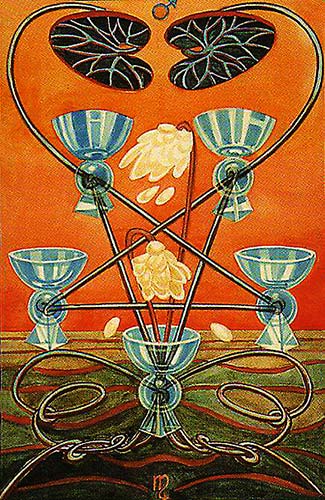 Five of Cups (Disappointment) |
The Crossing Card
|
The Future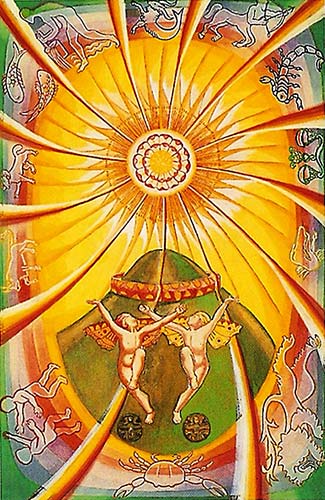 XIX – The Sun |
|
|
|||
The Significator represents what the main theme of the reading deals with, the initial situation.
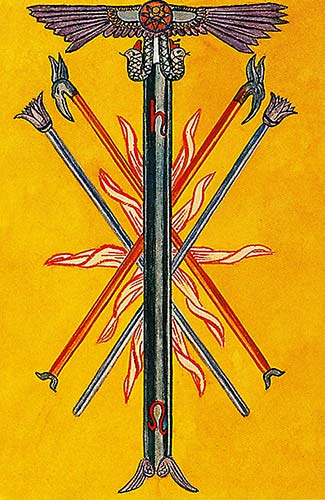
Five of Wands (Strife)
Astrological Correspondence: Saturn in Leo
The Five of Wands represents conflict, struggle, and the tension that arises from competing forces. The card features five crossed wands in an unbalanced configuration, with flames emanating erratically, symbolising disarray and discord. Saturn, the planet of limitations and discipline, meets the fiery and bold energy of Leo, creating a clash between authority, control, and the need for self-expression.
This card indicates a period of difficulty where challenges arise, either from external competition or internal conflicts. It reflects a situation where one's will and energy are met with resistance, demanding resilience and adaptability. Despite the chaotic energy, the Five of Wands also suggests an opportunity for growth through struggle, as obstacles force us to refine our approach and test our strength. It reminds you that conflict, while uncomfortable, can catalyse transformation and clarity.
In Relationships: The Five of Wands can indicate tension or disagreement. There may be a power struggle, competition, or a need to assert one's own desires. You are advised to navigate these challenges with patience and understanding.
In Work: This card suggests competition or conflict in the workplace. You may be facing challenges from colleagues or external forces. It is a time to maintain focus and rise above the noise to stay on course.
Spiritually: The Five of Wands represents the struggle between different aspects of the self. You may experience internal conflict or confusion about your spiritual path. It calls for introspection and a deeper understanding of the forces at play.
When ill-dignified: The Five of Wands suggests the conflict may be unnecessarily escalated, or you may be caught up in petty struggles. It warns against being distracted by trivial matters and encourages you to focus on the greater goal.
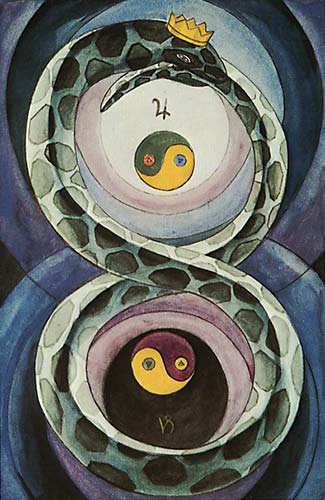
The Crossing Card denotes an added impulse that compounds the initial card, whether complimentary or contradictory.
Two of Disks (Change)
Astrological Correspondence: Jupiter in Capricorn
This card symbolises the dynamic balance between opposing forces and the ever-shifting nature of material reality. The two disks in motion reflect the fluid and cyclical nature of life's material aspects, such as work, resources, and finances. The snake and yin-yang imagery emphasises the constant flow of these aspects and the need to navigate them with adaptability and flexibility.
This card suggests you are experiencing—or will soon encounter—change or fluctuation in material matters. The Two of Disks advises you to stay nimble and open to shifting circumstances, reminding us that change is inevitable and can be an opportunity for growth. The balance between the two disks represents the ability to manage competing demands, integrating opposing forces to maintain equilibrium.
The Two of Disks also brings the influence of Jupiter in Capricorn, which encourages expansive growth and the pursuit of long-term success within the structure of discipline and responsibility. It suggests the need to adapt to changes while maintaining focus on practical goals and building solid foundations for the future.
In Relationships: The Two of Disks may indicate the need to juggle multiple aspects of life, such as balancing work, home, and romantic commitments. It can represent the fluid, ever-changing nature of relationships, calling for the ability to adapt to shifts in dynamics.
In Work: The Two of Disks suggests a need to balance various aspects of career and business. It represents the challenges of managing multiple projects, finances, or priorities, and advises adaptability and resourcefulness in the face of ever-changing circumstances.
Spiritually: The Two of Disks calls for balance and the ability to adapt to changes in one's spiritual path. The card warns against being rigid and encourages you to flow with the changes and challenges of your spiritual journey.
When ill-dignified: The Two of Disks can signify instability, indecision, or being overwhelmed by too many competing priorities. It may indicate a lack of balance, difficulty managing material matters, or an inability to adapt to changing circumstances. In the worst case, it may suggest that you are resisting necessary changes or are being stretched too thin.
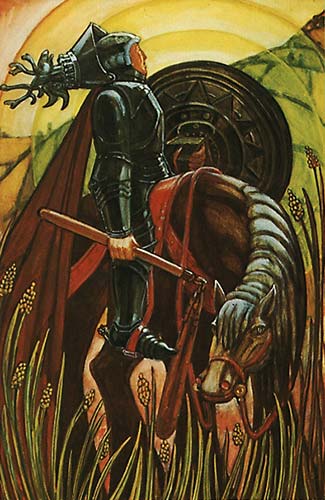
The Crown stands for what the asker is aware of consciously.
Knight of Disks
Element: Fire of Earth
Astrological Correspondence: Aquarius
The Knight of Disks represents the dynamic, action-oriented force within the Earth element, focused on practical innovation and intellectual transformation. The Knight is depicted riding a horse, stopped in a field ripe for harvest, symbolising his thoughtful yet purposeful approach to change. Unlike other Knights fuelled by raw energy, the Knight of Disks harnesses a clear vision that guides his methodical actions in the material world.
His element, Fire of Earth, signifies the application of passionate, transformative energy to the practical, grounded realm of materiality. The Knight of Disks is driven by the intellectual spark that ignites new ideas, and he can bring those ideas into tangible form, manifesting lasting change. His actions are grounded in practicality, and his innovative thoughts challenge the status quo while ensuring they are feasible and rooted in the physical world.
This card encourages us to think creatively, apply new solutions with a solid, practical foundation, and transform the material realm through intellect and purpose. The Knight of Disks teaches that change can be achieved through thoughtful, intentional actions that balance idealism with grounded reality.
In Relationships: The Knight of Disks can indicate a partner who is intellectual, innovative, and has a vision for the future. He may bring new ideas or approaches to a relationship, often seeking to create stability through innovation. However, the Knight of Disks may also point to a relationship where intellectual connection is prioritised over emotional intimacy.
In Work: The Knight of Disks suggests someone who is a visionary and can apply new ideas to achieve material success. It indicates a time when intellectual work and practical application can yield significant results. The card encourages thinking outside the box but in a way that is grounded in reality.
Spiritually: The Knight of Disks represents pursuing new ideas and knowledge. It encourages you to explore innovative approaches to spiritual practice while maintaining a grounded, practical approach. The Knight represents intellectual clarity and the application of new concepts in your spiritual journey.
When ill-dignified: The Knight of Disks can indicate a lack of flexibility or a rigid, dogmatic approach to life. You may be overly focused on material gain or be unwilling to consider new perspectives or approaches. There may also be an overreliance on intellectual reasoning at the expense of emotional or spiritual insight.
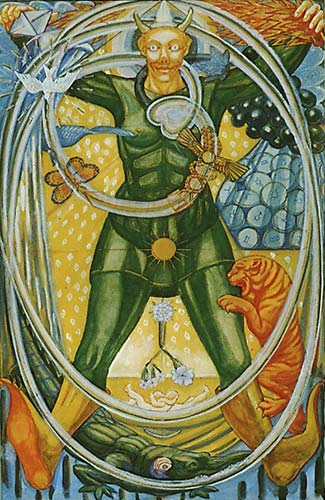
Foundation card reveals unconscious driving forces that the querent may not be aware of.
0 – The Fool
(Air, Uranus, Aleph)
The Fool of the Thoth deck embodies the chaotic, boundless energy of pure potential, untouched by form or limitation. He is the alpha and omega of the journey, the primordial force from which all creation arises. Corresponding to Aleph, the breath of life, and the element of Air, the Fool represents the vibrant, unpredictable nature of Uranus, the planet of sudden change and divine inspiration.
The figure of The Fool is richly adorned, standing amid a swirling maelstrom of symbolic forms. He wears motley robes to represent his openness to all experiences, while the winged sun at his feet symbolises the life-giving power of the divine. Around him whirl a tiger (representing instinct and primal fear), a crocodile (a guardian of the mysteries and a symbol of time), and a rainbow-hued disk, representing the harmony of all elements. The Fool holds a blazing torch in one hand and a crystal cup in the other, signifying the balance of will and receptivity. One foot is grounded in the world, while the other stands on the fourth wall, as if attempting to step into our world.
In Relationships: The Fool represents the potential for new beginnings and uncharted emotional experiences. It encourages you to approach relationships with innocence and trust, unburdened by fears or preconceptions.
In Work: This card advises bold action and faith in one's ideas. It suggests venturing into unfamiliar territory and taking inspired risks, understanding that growth lies in embracing uncertainty.
Spiritually: The Fool symbolises the seeker's initial step on the path to enlightenment, an act of surrender to the cosmic current. It urges you to trust the process and let go of the need for certainty.
When ill-dignified: The Fool warns of chaos, recklessness, or naivety. You are cautioned to discern whether you are pursuing freedom or fleeing responsibility and examine whether your actions align with higher wisdom.

The Recent Past represents past events and concerns.
Five of Cups (Disappointment)
Astrological Correspondence: Mars in Scorpio
The Five of Cups represents emotional sorrow, disappointment, and a focus on the negative aspects of an emotional situation. It speaks to moments of grief, regret, or mourning, especially when someone is caught up in the emotional aftermath of a loss.
The five cups are arranged in a pentagram formation. The arrangement of the cups signifies emotional disconnection or frustration, with the structure symbolising a closed, introspective emotional state. This card suggests a focus on what has been lost, often pointing to emotional difficulty or missed opportunities. However, the upright cups hint at the possibility of new emotional experiences or opportunities that may be overlooked because of the current focus on loss.
In Relationships: The Five of Cups represents grief or emotional loss. There may be feelings of disappointment or regret, and you may be mourning a past relationship or the end of a particular phase. It's important for you to remember that healing and new emotional opportunities are available if you choose to focus on them.
In Work: The Five of Cups suggests emotional setback, loss, or failure. You may have experienced disappointment in your career, but the card also encourages you to focus on opportunities that remain. The Five of Cups is a reminder that there are always new directions to explore, even when setbacks occur.
Spiritually: The Five of Cups can represent emotional pain or disillusionment with the spiritual journey. You may be mourning your perceived failures or feeling disconnected from your spiritual practices. However, the card encourages a shift in perspective, reminding you to look towards healing and renewal.
When ill-dignified: The Five of Cups can represent prolonged grief or an inability to move past emotional loss. You may be stuck in a cycle of self-pity or emotional stagnation, failing to see the positive opportunities that remain. There may be an excessive focus on the negative aspects of a situation, hindering emotional recovery.

The Future depicts that which lies ahead.
Two of Disks (Change)
Astrological Correspondence: Jupiter in Capricorn
This card symbolises the dynamic balance between opposing forces and the ever-shifting nature of material reality. The two disks in motion reflect the fluid and cyclical nature of life's material aspects, such as work, resources, and finances. The snake and yin-yang imagery emphasises the constant flow of these aspects and the need to navigate them with adaptability and flexibility.
This card suggests you are experiencing—or will soon encounter—change or fluctuation in material matters. The Two of Disks advises you to stay nimble and open to shifting circumstances, reminding us that change is inevitable and can be an opportunity for growth. The balance between the two disks represents the ability to manage competing demands, integrating opposing forces to maintain equilibrium.
The Two of Disks also brings the influence of Jupiter in Capricorn, which encourages expansive growth and the pursuit of long-term success within the structure of discipline and responsibility. It suggests the need to adapt to changes while maintaining focus on practical goals and building solid foundations for the future.
In Relationships: The Two of Disks may indicate the need to juggle multiple aspects of life, such as balancing work, home, and romantic commitments. It can represent the fluid, ever-changing nature of relationships, calling for the ability to adapt to shifts in dynamics.
In Work: The Two of Disks suggests a need to balance various aspects of career and business. It represents the challenges of managing multiple projects, finances, or priorities, and advises adaptability and resourcefulness in the face of ever-changing circumstances.
Spiritually: The Two of Disks calls for balance and the ability to adapt to changes in one's spiritual path. The card warns against being rigid and encourages you to flow with the changes and challenges of your spiritual journey.
When ill-dignified: The Two of Disks can signify instability, indecision, or being overwhelmed by too many competing priorities. It may indicate a lack of balance, difficulty managing material matters, or an inability to adapt to changing circumstances. In the worst case, it may suggest that you are resisting necessary changes or are being stretched too thin.
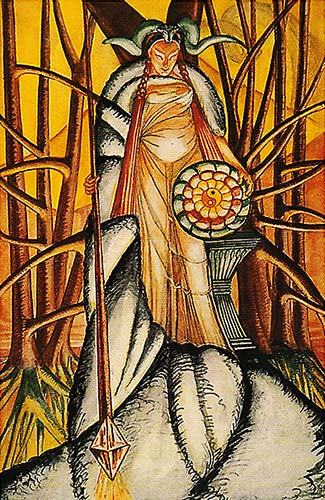
The Querent represents the asker and their attitude towards the subject of the reading.
Princess of Disks
Element: Earth of Earth
The Princess of Disks represents the physical manifestation of the Earth element. Eternally pregnant, she embodies the material world in its most pure and unrefined state, symbolising the potential to bring the intangible into tangible form. The Princess of Disks is depicted plunging a spear into the earth while holding a large disk, symbolising both her connection to the Earth and her potential to manifest the material world through patience and diligent effort.
The Princess is connected to nature, the land, and the physical reality around her, representing abundance, fertility, and the ability to bring material success into reality. This card suggests that material growth is achieved through practicality, persistence, and grounded action. The Princess of Disks embodies a youthful, fresh perspective on the material world, often indicating the beginning of a new venture or an exploration into one's potential in the material realm.
Her presence in a reading may point to a period where you focus on practical matters, cultivating the resources necessary for future success. The card serves as a reminder that steady work, attention to detail, and a connection to nature are key to manifesting your goals in the material world.
In Relationships: The Princess of Disks can represent someone who is nurturing and grounded. She may be a caretaker or someone who brings stability to the relationship. This card can also suggest new beginnings or fresh, grounded energy entering a relationship, possibly indicating the start of something long-term and stable.
In Work: The Princess of Disks symbolises a time of new beginnings or a fresh approach to material pursuits. It may point to the early stages of a business or financial venture, or the development of a new skill or talent that will later bring success. This card encourages focus, diligence, and practicality in your career.
Spiritually: The Princess of Disks represents grounding, practicality, and connecting with the Earth. She may symbolise the need to ground one's spiritual practice in the physical realm. The card suggests that tending to the material world and embracing its lessons nurtures spiritual growth .
When ill-dignified: The Princess of Disks can point to an overemphasis on material concerns or an inability to appreciate the deeper, spiritual aspects of life. There may be a tendency to become attached to wealth, status, or possessions, neglecting more meaningful pursuits. She may also indicate a lack of maturity in approaching material matters.

External Forces represents the influence of others in your life as well as trends in your relationships with others.
VII – The Chariot
(Cancer, Cheth)
The Chariot represents triumph through willpower, discipline, and the unification of opposing forces. Associated with Cheth, the fence, it symbolises both protection and the boundaries that define and direct progress. Cancer, the zodiac sign of emotional depth and intuition lends the card its nurturing energy, ensuring that strength is tempered with compassion.
The Charioteer is a figure of regal composure, encased in golden armour and standing within a shell-like chariot. This shell evokes the protective qualities of Cancer, while the armour signifies spiritual and emotional fortitude. In his hands, he holds the Holy Grail, a symbol of divine purpose and spiritual attainment. The four sphinxes that draw the chariot—two white and two dark—represent the dual forces of light and darkness, which the Charioteer must master to move forward. The canopy above him is adorned with stars, linking his journey to celestial guidance and higher aspirations.
In Relationships: The Chariot indicates a relationship that requires balance and mutual effort to succeed. It suggests overcoming obstacles through shared determination and a focus on common goals.
In Work: This card signifies victory achieved through discipline, focus, and the ability to steer conflicting forces towards a unified purpose. You are encouraged to remain steadfast and clear in your intentions.
Spiritually: The Chariot represents the journey of the soul towards higher awareness, guided by the alignment of will and intuition. It calls you to embrace your inner strength and move forward confidently.
When ill-dignified: The Chariot warns of a loss of direction, internal conflict, or reckless ambition. You are advised to reassess your goals and ensure you are not being led astray by conflicting desires or external pressures.
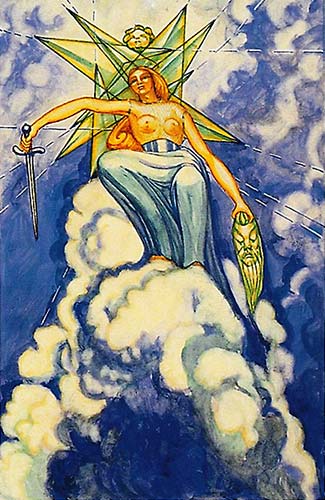
Hopes and Fears shows the expectations you have concerning the outcome of your question.
Queen of Swords
Element: Water of Air
Astrological Correspondence: Libra
The Queen of Swords represents clarity, discernment, and impartial judgement. She sits on a throne surrounded by clouds, symbolising the ethereal, mental realm she rules. Holding a sword in one hand and a man's head in the other, the Queen of Swords reflects her sharp perception and ability to cut through illusion. The severed head is a symbolic representation of her power to eliminate distractions, falsehoods, and anything that no longer serves her purpose, emphasising decisiveness and ability to detach from unnecessary emotions to focus on the truth.
The Queen's presence evokes the quality of Air, which is associated with mental clarity, communication, and intellectual understanding. Her demeanour is one of objectivity and cool-headedness, capable of assessing situations with wisdom and fairness. The severed head in her grasp reinforces the Queen's capacity to make hard decisions, cutting away what is obsolete or harmful with ruthless clarity while maintaining an unwavering commitment to truth.
As a symbol of clear communication and discernment, the Queen of Swords encourages you to approach challenges with an open . She advises using logic and wisdom to navigate complex situations, maintaining emotional detachment when necessary to see things as they are.
In Relationships: The Queen of Swords represents the need for clear and honest communication. She values intellectual compatibility and truth over emotional entanglements. This card may indicate emotional distance or intellectual examination in a relationship. You may need to cut through illusions in your romantic life and face the reality of the situation, no matter how harsh.
In Work: The Queen of Swords signifies leadership through intellect, fairness, and judgement. She brings wisdom, clarity, and the ability to make decisions based on objective reasoning. She represents someone who can analyse situations and cut through confusion with ease. However, in her ill-dignified form, the Queen can become too detached or critical, focusing too much on logic and not enough on empathy or intuition.
Spiritually: The Queen of Swords calls for a methodical mind and discernment in the search for truth. Her guidance suggests you must cut through distractions, illusions, and emotional noise to access your deepest spiritual insights. While she brings wisdom, she also warns you not to become too detached or intellectual, urging you to balance mind and spirit.
When ill-dignified: The Queen of Swords represents emotional coldness, sharp criticism, and harsh judgement. You may be detached, too critical of others, or unable to see the human side of a situation. The risk of becoming overly intellectual or critical without empathy could lead to isolating oneself or damaging relationships.

The Outcome of your question. Interpret this card in the context of the entire reading and as an indicator of the path you are currently on, but not necessarily bound to.
XI – Lust
(Leo, Teth)
Lust, known as Strength in many other decks, takes on a unique and profound meaning in the Book of Thoth. This card signifies the ecstatic embrace of life's passions and the power derived from uniting primal instincts with spiritual purpose. Associated with Teth, the serpent, it symbolises both the kundalini energy and the continuous cycles of transformation and renewal. Leo, the zodiac of courage and vitality, infuses the card with boundless confidence and creative expression.
The central figure is a woman riding a multi-headed beast, a symbol of primal forces mastered and directed towards a higher purpose. Her nudity represents authenticity and fearlessness, while the cup she holds aloft is the Holy Grail, symbolising the ultimate spiritual goal. The beast itself, covered in fiery hues, represents the dynamic power of creation, destruction, and renewal. The background is filled with swirling red and gold, reflecting the intensity of life force and divine energy.
In Relationships: Lust represents passion, desire, and a fearless embrace of emotional intensity. It encourages you to fully engage with your relationships, revelling in love's transformative power.
In Work: This card signifies success achieved through boldness, enthusiasm, and a connection to one's creative instincts. You are advised to channel your energy into projects that ignite your passion.
Spiritually: Lust symbolises the awakening of spiritual vitality and integrating one's primal and divine natures. It calls you to surrender to the ecstatic flow of universal energy.
When ill-dignified: Lust warns of unchecked desires, destructive passions, or an overindulgence in material pleasures. You are advised to restore balance and align your desires with a higher purpose.